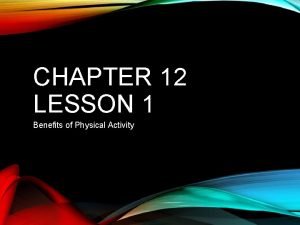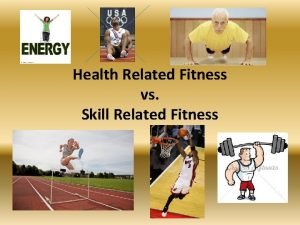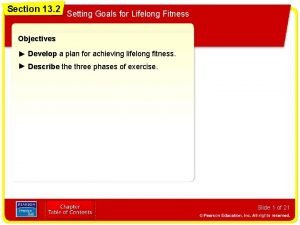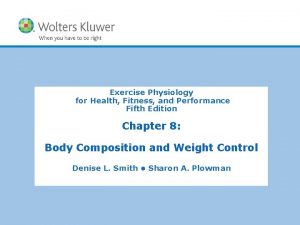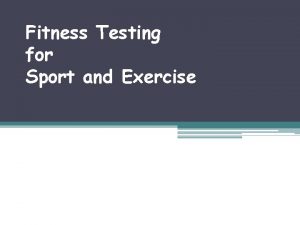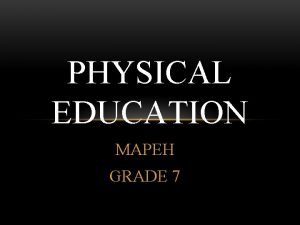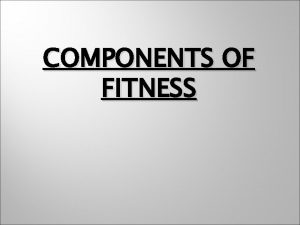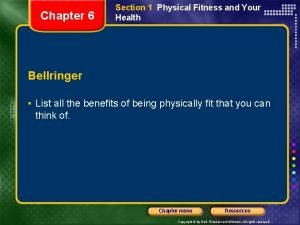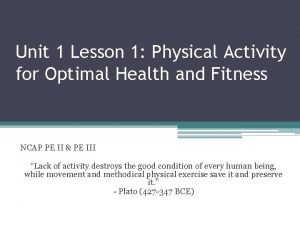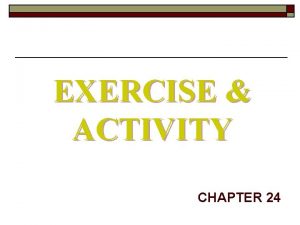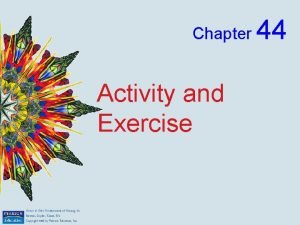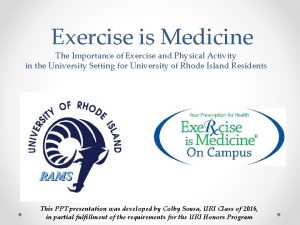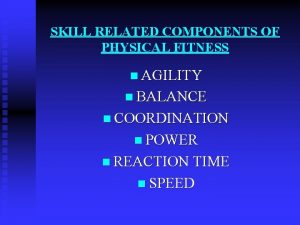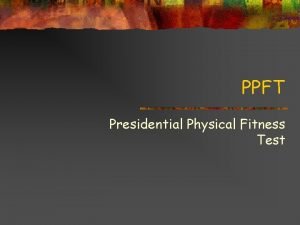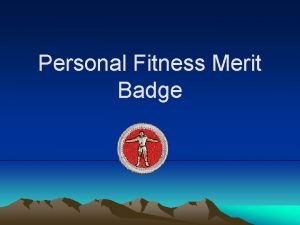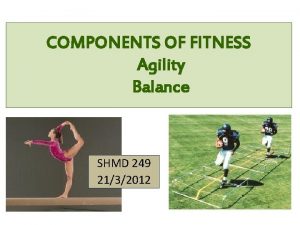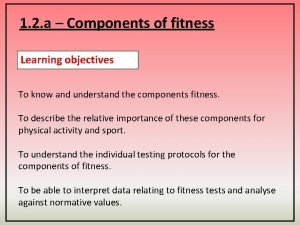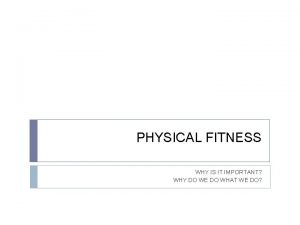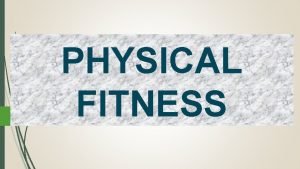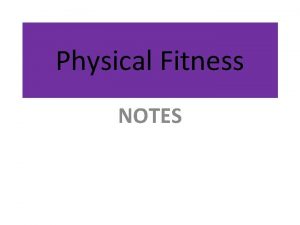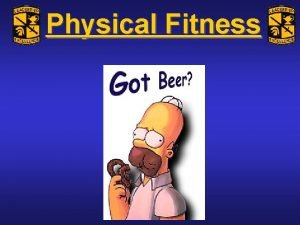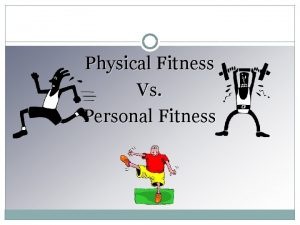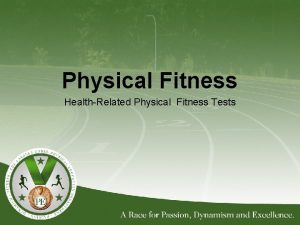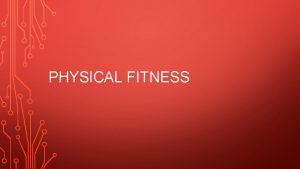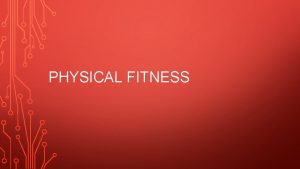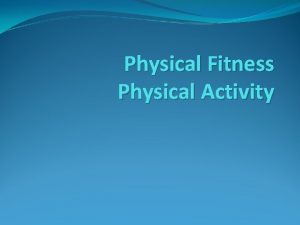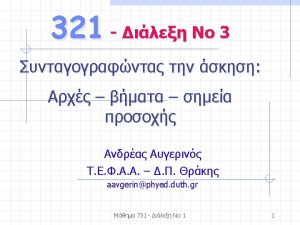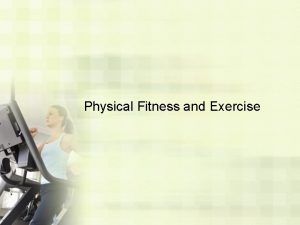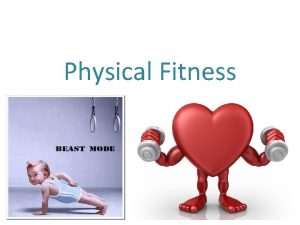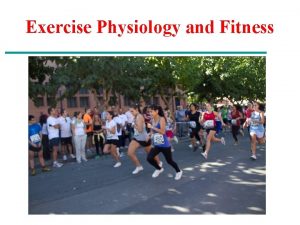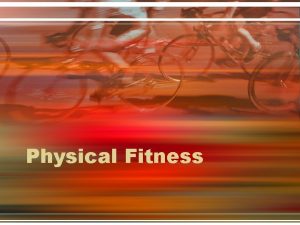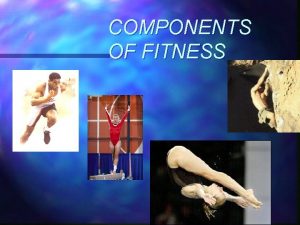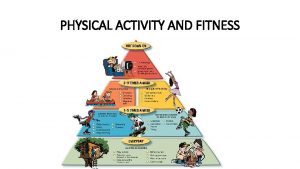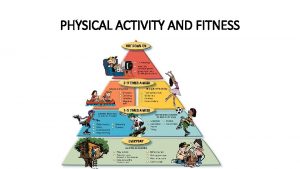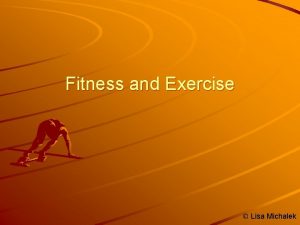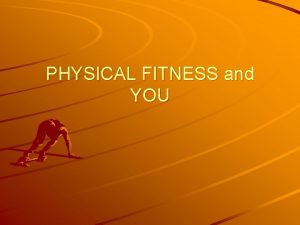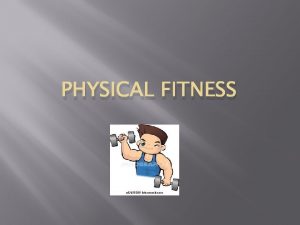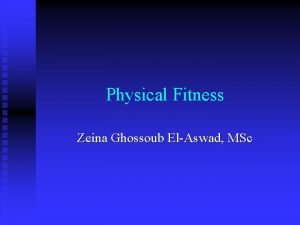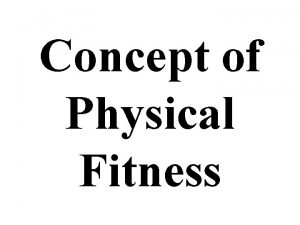EXERCISE AND FITNESS THE IMPORTANCE OF PHYSICAL ACTIVITY























- Slides: 23

EXERCISE AND FITNESS THE IMPORTANCE OF PHYSICAL ACTIVITY SETTING GOALS FOR LIFELONG FITNESS PHYSICAL ACTIVITY AND SAFETY

BENEFITS OF PHYSICAL ACTIVITY PHYSICAL BENEFITS • Cardiovascular System • Weight Maintenance • Bone Strength • Balance and Coordination

BENEFITS OF PHYSICAL ACTIVITY PSYCHOLOGICAL BENEFITS During continuous exercise, your brain releases endorphins Endorphins: Chemicals that block pain messages from reaching your brain cells

BENEFITS OF PHYSICAL ACTIVITY Social Benefits - -

FITNESS COMPONENTS Cardiorespiratory Endurance, Muscular Strength, Muscular Endurance, Flexibility, Body Composition

1. CARDIORESPIRATORY ENDURANCE - Your heart, blood vessels, and lungs are able to distribute nutrients and oxygen and remove wastes efficiently during prolonged exercise. - As the heart muscles grow stronger, more blood is pumped with each beat. Example: Jogging, Walking, Sports, Rollerblading, Swimming

2. MUSCULAR STRENGTH The ability of a muscle to EXERT force. Example: 1 rep max 3. MUSCULAR ENDURANCE The ability of your muscles to work for an extended time. Example: How many times you can lift a certain weight

4. FLEXIBILITY The ability to move a joint through its entire range of motion. - Can vary in different joints 5. BODY COMPOSITION The amount of fat tissue in your body compared to the amount of lean tissue.

TYPES OF PHYSICAL ACTIVITY Aerobic, Anaerobic, Isometric, Isotonic, Isokinetic

AEROBIC Ongoing physical activity that raises your breathing rate and heart rate EX. Cardio ANAEROBIC Intense physical activity that lasts for a few seconds to a few minutes. EX. 50 yd dash ISOTONIC Involves contracting and relaxing your muscles through the full range of motion EX. Free weights/barbells

ISOMETRIC Isometric is a term that is made up of 2 words, namely, "iso" and "metric, " which mean "equal" and "length, " respectively. As the term suggests, isometric exercises refer to exercises that are performed without altering the length of muscles. EX. Plank/ db’s front/lateral raises ISOKENETIC ISO- Equal Kenetic-Machines Exercises include machines that provide equal resistance through a range of motion EX. Gold’s Gym, Leg extension machine

FITT FORMULA USE THE FITT FORMULA TO IMPROVE ANY OF THE FITNESS COMPONENTS FREQUENCY: 3 DAYS A WEEK INTENSITY: HEART RATE/TALK TEST TIME: AMOUNT OF TIME (20 -30 MINUTES) TYPE: WHAT YOU DO (AEROBIC/ISOTONIC/CROSS-TRAINING)

FITNESS PLAN

FITNESS PLAN OBJECTIVES Explain some of the physical, psychological, and social benefits of physical activity. Define and self assess the 5 components of fitness. Develop and analyze a plan for lifelong fitness. Directions Each student will complete each part of the assignment by assessing current fitness levels, setting goals, setting up fitness plan, and identify the principles and components of fitness.

PART ONE CURRENT FITNESS LEVEL ASSESSMENT Cardiorespiratory Fitness Resting Heart Rate The Resting Heart Rates of people vary widely but generally are related to their cardiorespiratory fitness. The heart rate of someone with average cardiorespiratory fitness is somewhere between 60 -80 beats per minute. A resting heart rate below 72 beats usually indicates a fairly good fitness level. To improve your cardiorespiratory fitness, you need to exercise so that you keep your heart rate within a certain range, which is called your Target Heart Rate. Resting Heart Rate - To find your resting pulse, you’ll need to watch a clock that displays seconds. (The best time to take pulse is when you first get up or after a period of time resting) Locate a pulse point on the inside of your wrist using your first two fingers. Don’t press against the pulse point, but instead rest your index and middle finger over the pulse point with enough pressure to feel a distinct pulse. Using the watch, count the number of pulse beats during 1 minute. The number you get is your resting pulse or resting heart rate.

TARGET HEART RATE Find your maximum HR: 220 – your age Ex. 220 – 14 = 206 BPM THR minimum limit Max HR x 0. 6 = THR Minimum (206 x. 6 = 123) THR maximum limit Max HR x 0. 8 = THR Maximum (206 x. 8 = 164)

PART ONE CURRENT FITNESS LEVEL ASSESSMENT Flexibility Sit-n-Reach: _____ Muscular Strength/Endurance Sit-ups: _______ Push-ups: _______ Body Composition (BMI) Current Weight: Current Height: BMI:

PART TWO FITT FORMULA & PHYSICAL COMPONENTS Frequency: How often you exercise (3 -5 times a week) Intensity: How hard (Target HR, “Talk Test”) Time: How long (20 -30 minutes) Type: What exercise

PART THREE FITNESS PLAN Design your personal fitness plan using the attached chart. Make sure to fill in ALL columns. Each component must be used a minimum of 3 times during the week. You must have at least 3 different activities for the “workout” portion and at least 1 activity for each of the “warm-up, ” “stretching, ” “cool down, ” & “stretching” portions. The column labeled Time/Sets means that you put how many minutes you will do the activity or how many sets (12 repetitions = 1 Set). The column labeled Components means that you will list the physical component you will be working on during that particular portion of the workout.

DAY ACTIVITY TIME/ COMPONENT SETS Monday Warm-up – Dynamic Stretching - Static Work out – CV/CR & MS/ME/CS Break down ( main work-out) Cool Down –Slow down version Stretching – Static 3 min 20 min 7 min 8 min 3 min 2 min Fitness Component(s)

DAY ACTIVITY TIME/ COMPONENT SETS Tuesday Warm-up – Dynamic Stretching - Static Work out – CV/CR & MS/ME/CS Break down ( main work-out) Cool Down –Slow down version Stretching – Static 3 min 20 min 7 min 8 min 3 min 2 min Fitness Component(s)

DAY ACTIVITY TIME/ COMPONENT SETS Wednesday Decisions: Cardio days/ Strength days Or Combo work-outs W-up 5 Fitness Component(s) Main 20 MUST HAVE C-dn 5

BUILD YOUR WORK-OUT
 Physical fitness components and tests grade 9
Physical fitness components and tests grade 9 Chapter 12 lesson 1 benefits of physical activity
Chapter 12 lesson 1 benefits of physical activity Chapter 3 benefits of physical activity
Chapter 3 benefits of physical activity Health vs skill related fitness
Health vs skill related fitness Lifelong fitness formula
Lifelong fitness formula Exercise physiology for health, fitness, and performance
Exercise physiology for health, fitness, and performance Fitness testing for sport and exercise
Fitness testing for sport and exercise Health related fitness grade 7
Health related fitness grade 7 What are the two types of physical components
What are the two types of physical components Fitness chapter 6
Fitness chapter 6 Unit 1 lesson 1 the importance of fitness
Unit 1 lesson 1 the importance of fitness Hyperextension
Hyperextension Activity and exercise fundamentals of nursing
Activity and exercise fundamentals of nursing Physiological activity
Physiological activity Importance of exercise
Importance of exercise Ability to move body parts swiftly
Ability to move body parts swiftly Presidential physical fitness award
Presidential physical fitness award Sample 12-week physical fitness program bsa
Sample 12-week physical fitness program bsa How to get the average of hexagon agility test
How to get the average of hexagon agility test Ruler drop test physical fitness components
Ruler drop test physical fitness components Physical fitness
Physical fitness What component of fitness is 90 degree push up
What component of fitness is 90 degree push up Definition of physical activity
Definition of physical activity Physical fitness notes
Physical fitness notes


